5 Supreme Court Justices Signatures - 1912-1935 dated Autograph
Inv# AU1813 AutographTyped Letter, memorandum or cards signed by Supreme Court Justice, Willis Van Devanter, J.C. McReynolds, George Sutherland, Pierce Butler and Charles E. Hughes.
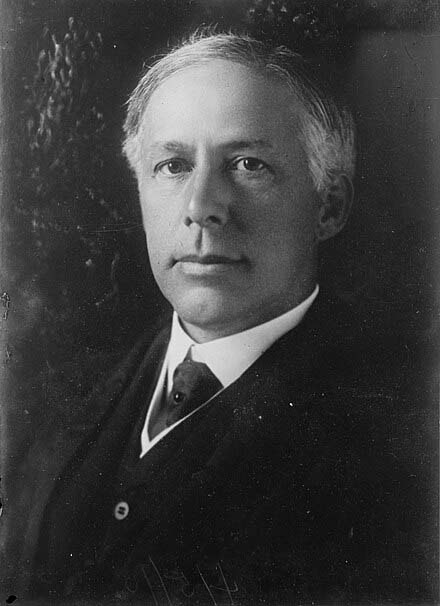
Willis Van Devanter (April 17, 1859 – February 8, 1941) was an American lawyer who served as an associate justice of the Supreme Court of the United States from 1911 to 1937. He was a staunch conservative and was regarded as a part of the Four Horsemen, the conservative bloc which dominated the Supreme Court during the 1930s.
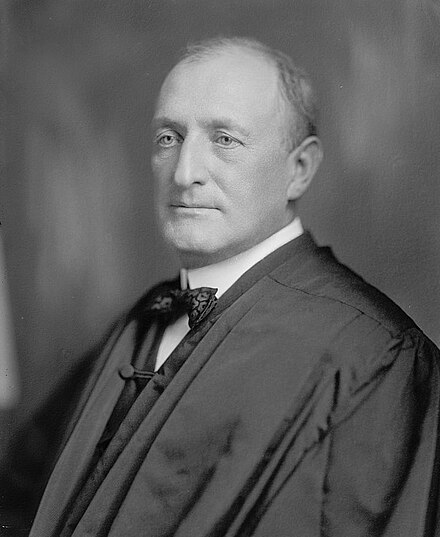
James Clark McReynolds (February 3, 1862 – August 24, 1946) was an American lawyer and judge from Tennessee who served as United States Attorney General under President Woodrow Wilson and as an associate justice of the Supreme Court of the United States. He served on the Court from 1914 to his retirement in 1941. McReynolds is best known today for his sustained opposition to the domestic programs of President Franklin D. Roosevelt and his personality, which was widely viewed negatively and included documented elements of overt antisemitism and racism. Born in Elkton, Kentucky, McReynolds practiced law in Tennessee after graduating from the University of Virginia School of Law. He served as the U.S. Assistant Attorney General during President Theodore Roosevelt's administration and became well known for his skill in antitrust cases. After Wilson took office in 1913, he appointed McReynolds as his administration's first attorney general. Wilson nominated McReynolds to the Supreme Court in 1914 to fill the vacancy caused by Associate Justice Horace Harmon Lurton's death. In his 26 years on the bench, McReynolds wrote 506 majority opinions for the Court and 157 dissents, 93 of which were against the New Deal. He was part of the "Four Horsemen" bloc of conservative justices who frequently voted to strike down New Deal programs. He assumed senior status in 1941 and was succeeded by James F. Byrnes. During his Supreme Court tenure, McReynolds wrote the majority opinion in cases such as Meyer v. Nebraska, United States v. Miller, Adams v. Tanner, and Pierce v. Society of Sisters. Due to his temperament, bigotry, and his opposition to the domestic programs of the FDR administration, McReynolds is sometimes included on lists of the worst Supreme Court justices. Read more at https://en.wikipedia.org/wiki/James_Clark_McReynolds
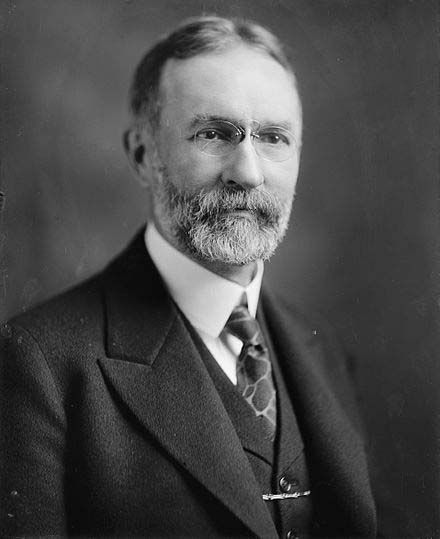
George Alexander Sutherland (March 25, 1862 – July 18, 1942) was an English-born American jurist and politician. He served as an associate justice of the U.S. Supreme Court between 1922 and 1938. As a member of the Republican Party, he also represented Utah in both houses of Congress.
Born in Buckinghamshire, England, Sutherland and his family moved to the Utah Territory in the 1860s. After attending the University of Michigan Law School, Sutherland established a legal practice in Provo, Utah, and won election to the Utah State Senate. Sutherland won election to the United States House of Representatives in 1900 and to the United States Senate in 1905. In Congress, Sutherland supported several progressive policies but generally aligned with the party's conservative wing. He won re-election in 1911 but was defeated in the 1916 election by Democrat William H. King.
Sutherland made up part of the "Four Horsemen", a group of conservative justices that often voted to strike down New Deal legislation. He retired from the Supreme Court in 1938, and was succeeded by Stanley Forman Reed. Sutherland wrote the Court's majority opinion in cases such as Village of Euclid v. Ambler Realty Co., Powell v. Alabama, Carter v. Carter Coal Co., Adkins v. Children's Hospital, and U.S. v. Curtiss-Wright Export Corp.
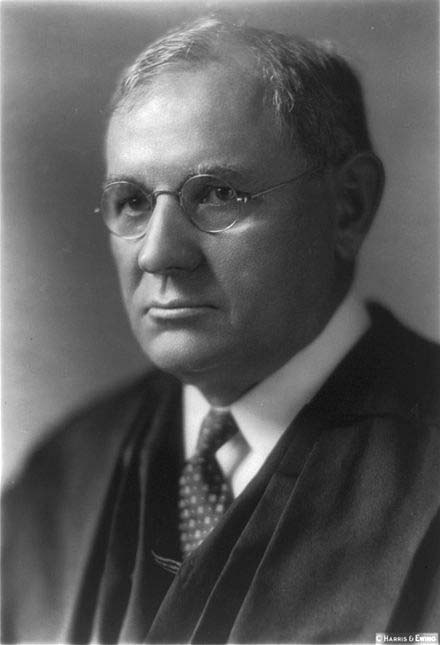
Pierce Butler (March 17, 1866 – November 16, 1939) was an American jurist who served as an associate justice of the Supreme Court of the United States from 1923 until his death in 1939. He is notable for being the first Supreme Court justice from Minnesota, and for being a Democrat appointed by a Republican president. He was a staunch conservative and was regarded as a part of the Four Horsemen, the conservative bloc that dominated the Supreme Court during the 1930s. A devout Catholic, he was also the sole dissenter in the later case Buck v. Bell, though he did not write an opinion.
Charles Evans Hughes, Sr. (April 11, 1862 – August 27, 1948). An American statesman, lawyer and Republican politician from New York. He served as the 36th Governor of New York (1907–1910), Associate Justice of the Supreme Court of the United States (1910–1916), United States Secretary of State (1921–1925), and the 11th Chief Justice of the United States (1930–1941). He was the Republican candidate in the 1916 U.S. Presidential election, losing narrowly to Woodrow Wilson. Hughes was an important leader of the progressive movement of the 1900s, a leading diplomat and New York lawyer in the days of Harding and Coolidge, and a leader of opposition to the New Deal in the 1930s. Historian Clinton Rossiter has hailed him as a leading American conservative.






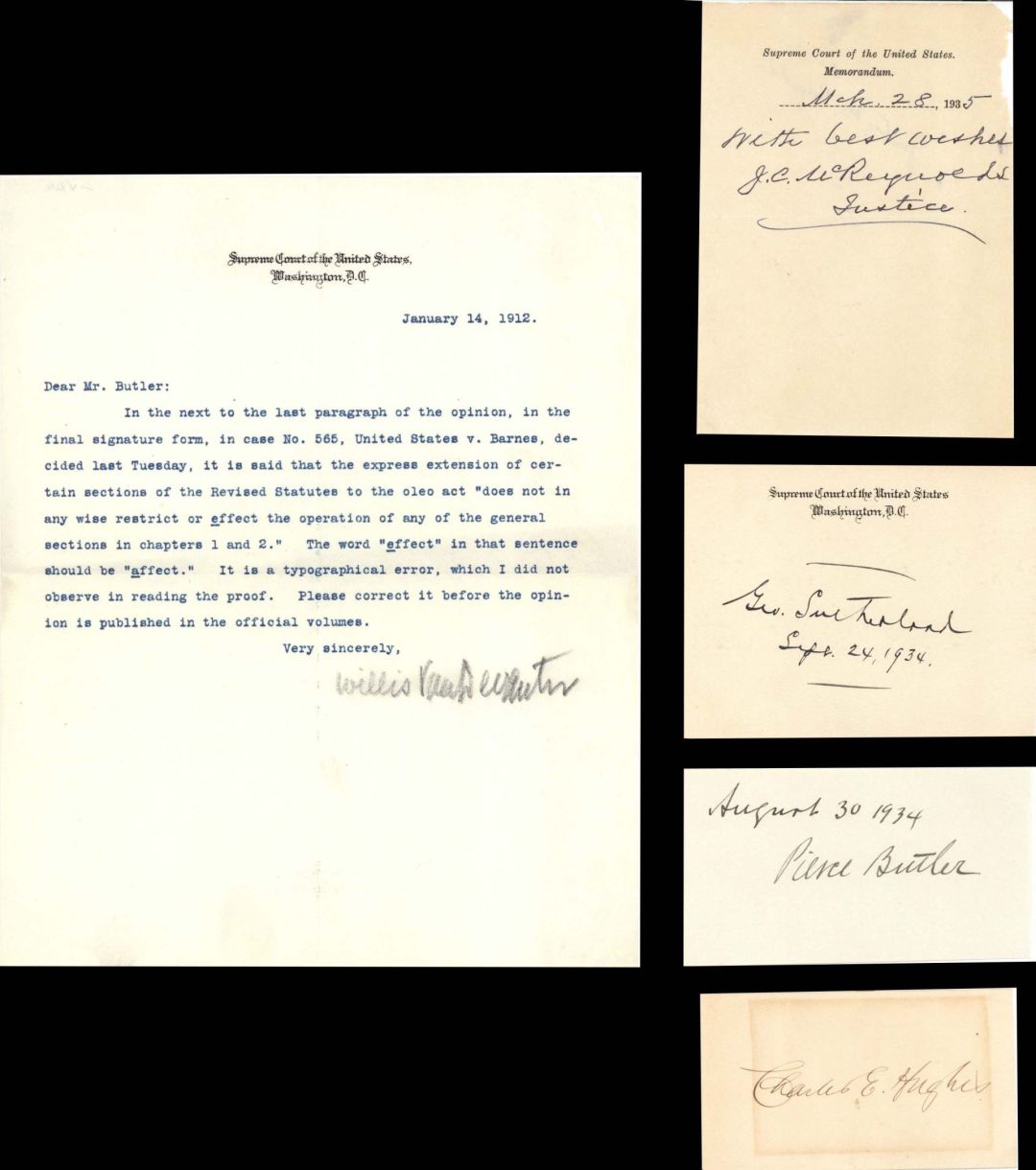




Ebay ID: labarre_galleries